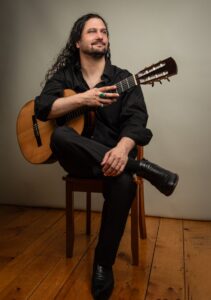Aaron Larget-Caplan wanted to be a rock star. Growing up in Denver, Colo., he played his electric guitar listening to cassette tapes of Led Zeppelin, Jimi Hendrix, and Ozzy Osbourne. But at 16 he saw a video in his high school Spanish class of guitarist Andrés Segovia playing composer Isaac Albéniz’s “Asturias (Leyenda),” the notes spinning from the guitar in virtuosic ribbons of sound.

Larget-Caplan had heard the tune before — a melody from it is used in “Spanish Caravan,” a 1968 song by The Doors. But this time, Larget-Caplan was enthralled. He remembers thinking, “That’s the real thing.”
Using money he had saved up from summer jobs, he bought his first classical guitar. “It was very cheap, and it was horrible,” he says. But there was something special about the sense of control he felt when playing. “No electronics, no effects,” he says. “Just the feeling of my flesh and fingernails against the strings and the vibration of the guitar against my chest. At the time, I thought it was the most beautiful thing I’d ever played.
“And the rest is history,” Larget-Caplan says.
He got his degree in classical guitar from the New England Conservatory and started his professional life in Boston, teaching music at the Boston Conservatory and UMass Boston. Last fall, he joined the Expanded Education faculty at New England Conservatory as an instructor in guitar. Larget-Caplan has released 11 solo albums in styles ranging from Spanish Flamenco to Baroque. On Saturday, Sept. 13, he’ll perform a concert titled “Revolutions in Music” at Wellfleet Preservation Hall.
Larget-Caplan has a better guitar now. In fact, he has three — “which I’m told isn’t that many,” he says. “But I can only play one at a time.” His primary guitar, which he uses for most of his concerts, was made by French luthier Olivier Fanton d’Andon. Larget-Caplan has had it for almost 10 years. “I just adore it,” he says. “It has a character. Most of the time, we get along really well.”
Its top is made of spruce, the back and sides of rosewood. The six strings are nylon, which makes for a quieter, more intimate sound than is produced by steel strings, says the guitarist. His instrument and style of playing are adaptable to many musical genres. “On my right hand, instead of a pick, I use all of my fingers,” he says, which allows him to pluck intricate melodies and harmonies. “There’s a lot of choreography going on.”
At Preservation Hall, Larget-Caplan will play pieces by 10 different composers, including a composition of his own. He tried to choose music that represented the idea of revolution, he says, whether that meant the music or composer was revolutionary or the idea of playing the music on guitar was.
The concert opens with two tangos. The first, “Tango en Skaï” by Roland Dyens, has a lot of improvisation in it, says Larget-Caplan. “It’s very jazzy, but it’s not jazz,” he says. The second tango, Argentinian composer Astor Piazzolla’s “Verano Porteño,” is revolutionary because of the composer himself. “He truly changed the idea of tango,” says Larget-Caplan. “He rewrote tango and introduced it to classical music, where it went beyond just music for a dance.”
After Johann Sebastian Bach’s Prelude in D minor and Fugue in C minor, there’s a piece by “the amazing John Cage,” says Larget-Caplan. “He was probably one of the most influential American musicians in the 20th century.” Cage’s “In a Landscape,” composed for piano in 1948, “explores sound and resonance,” Larget-Caplan says. “It’s meditative, but it’s not meditation.” In a recording of the piece, Larget-Caplan’s pure, clear notes follow each other like steps on a staircase, somehow sounding inevitable.
The program includes some “twisted music,” says Larget-Caplan — pieces that “make you question sound, what we hear, and our place in the world.” He’s talking about Douglas Knehans’s 2025 composition “Cloud Lachrymae,” in which the performer plays a duet with electronic sounds on his computer.
“Twisted music” could also refer to Russian composer Nikita Koshkin’s “Usher Waltz (After Edgar Allen Poe),” inspired by Poe’s 1839 short story “The Fall of the House of Usher.” “It’s about a character who’s going mad,” says Larget-Caplan. “There’s death and wildness in there, and that is shown in the music without me having to say a word.” His guitar is like a canvas: “I look at a piece of music,” he says, “and I get to paint a story.”
Larget-Caplan’s own piece, “Moving Still,” was included on his 2022 EP Honey Cadence. “I wanted to write a piece that doesn’t go anywhere,” he says. “There is no chord progression. I use color and different textures to create the dramatic arc of the music.” Two alternating notes, in a minor third interval, are a constant thread in this piece. Around that spine, Larget-Caplan builds a body of harmony that allows the listener to feel movement while remaining in place.
For all of this music, Larget-Caplan plays solo. But it doesn’t daunt him. He enjoys being on stage, feeling the transfer of energy between performer and audience. And besides, “I’m not alone,” he says. “I have the guitar.”
Musical Revolutions
The event: A performance by guitarist Aaron Larget-Caplan
The time: Saturday, Sept. 13, 7 p.m.
The place: Wellfleet Preservation Hall, 335 Main St.
The cost: $25 at wellfleetpreservationhall.org.
